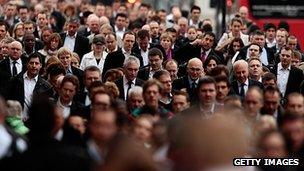Empower councils to end their 'subservience' to Whitehall say MPs
- Published

Taxpayers should know how much money is spent on local government, the MPs say
Local authorities across England should be given more financial freedom to end their "subservience" to Whitehall, a group of MPs is suggesting.
Councils should be able to raise their own revenues, such as a "tourist tax", to supplement central funding if backed by residents, a Commons committee said.
A new code setting out councils' powers would also form part of a "devolved settlement" for England, they added.
But ministers said there was "little appetite" for multiple local taxes.
According to MPs on the Political and Constitutional Reform Committee, England is lagging behind Scotland, Wales and Northern Ireland in terms of determining new "constitutional and democratic" arrangements underpinned by a "new financial settlement".
'Micromanagement'
Promoting localism without granting additional financial powers was "worthless", the cross-party body said in a report, arguing that local government needed genuine independence if it was to break free "from the micromanagement of Whitehall".
The share of money raised from general taxation allocated to councils should be made much more "clear and honest", it suggested, to improve accountability and understanding among taxpayers.
Details of the amount of income tax people paid that is spent on local government should be highlighted on workers' pay slips, it said.
As local government budgets are equivalent to about 75% of all the income tax raised in England, the MPs said one option in future was for two-thirds of the income tax take to be specifically ring-fenced for councils' use to underwrite their independence.
MPs said the principle had already been agreed in Scotland, and proposed in Wales, and councils in England should ultimately have responsibility for a "sizeable" part of the income tax take.
On top of guaranteed central funding, the MPs said councils should be free to raise their own revenue - such as a tax on hotel beds - if they had the "explicit consent" of their residents in a referendum.
The rights and powers of councils in relation to central government should also be set out in a new legal code, enshrined in law, the report said, replacing the thousand legal duties the MPs say are currently imposed on them.
'Equal partnership'
Since, under their proposals, there would be no change in the amount of money that councils got from Whitehall, or the way it was raised or distributed, the MPs said it would deliver a real boost to accountability with minimum administrative upheaval.
They are not proposing that English councils be given the same powers as the Scottish Parliament to potentially vary the rate of income tax - powers that could also be extended to the National Assembly for Wales under the Silk Commission proposals.
But Graham Allen, the Labour MP who is chairman of the committee, said the proposed package of changes was far-reaching and should be considered by all parties in the run-up to the next election as a means of "revitalising local democracy".
"Our report will help central and local government with a way forward and replace the daily negative exchanges with a settled democratic framework which puts the local elector in the driving seat," he said.
Current policies, he added, designed to promote localism, including the "city deals" scheme giving 28 towns and cities the right to spend tax receipts from local businesses, were a "step in the right direction".
Parliament's role
But Mr Allen said more needed to be done to build a "partnership of equals" between central and local government.
"We are seeing the devolution settlements in Scotland, Wales and Northern Ireland evolve to include devolved powers of taxation.
"Why should we in England be the only part of the union yet to have a devolved settlement?
"Local government in England could be the perfect vehicle for English devolution, as it would involve no further layers of elected politicians, no more taxation, and councillors have close links to their local areas."
Ministers said there was a "dramatic shift" of power away from Whitehall already taking place, with taxpayers able to trigger referendums in the event of "excessive" council tax rises and councils able to raise an estimated 70% of their income locally.
"However, I believe there is little public appetite for introducing a barrage of new local taxes, especially given the fact that council tax doubled under the last administration," said Local Government Minister Brandon Lewis.
"We also need to recognise the long-standing and hard-fought role of Parliament in overseeing and authorising taxation, accountable to the British people through the ballot box."
- Published28 January 2013
- Published29 October 2012
- Published19 December 2011
- Published9 November 2011